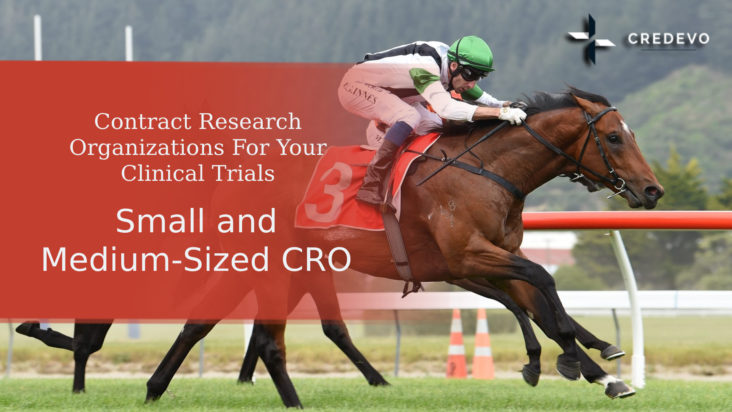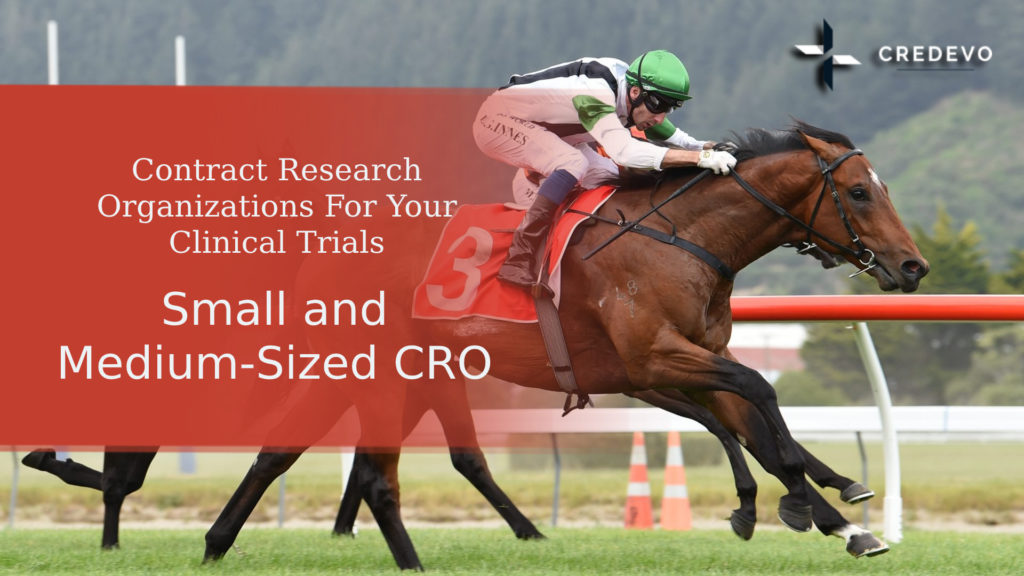Contract Research Organizations For Your Clinical Trials: Small and Mid-Sized CRO – Part II

Small and Mid-Sized Contract Research Organizations (CROs) for clinical trials occupy approximately about 44% of the market share of outsourced development works. These CROs are gaining interest and becoming the choice for startups, small and mid-sized pharmaceutical and biological companies. While in the first part of this article series on “Contract Research Organizations For Your Clinical Trials” the top 10 CROs were discussed, it’s rather important to understand the perspective about small to mid-size CROs as well.

The number, capabilities, and approach of these small to mid-size CROs are increasing consistently and it won’t be wrong to say that they now play a crucial role in drug development worldwide, particularly with the advantages they bring.
Top advantages with Small and Mid-Size CROs
Here are the top advantages with Small and Mid-Size CROs
- Single point of contact and flexibility,
- Easy to collaborate in a sponsor’s program from a strategic and cultural perspective,
- More accessible and affordable to small to mid-size pharmaceutical companies to accommodate limited funds.
A Small and Mid-Sized CRO
Choosing a small to mid-size range clinical research organization is complex compared to large CROs as it presents more challenges in selecting the right CRO as the list of CROs is extensive.
To simplify and make an efficient choice, this list can be classified based on
- Geographic region of their presence,
- Phase of trials they focus upon, and
- Therapeutic area of expertise.
Small and Mid-Sized CROs selection based on region
Based on geographic presence, small and mid-range CROs can be considered in the following regions
- North America
- Europe
- Asia Pacific
- The Middle East and Africa
- Latin America
CROs in North America
North America region is expected to dominate the contract research organizations (CRO) market with the potential in research that they bring. This may be due to the presence of a large number of biopharmaceutical, and pharmaceutical companies in this region, increasing R&D expenditures, and focus on outsourcing for clinical research studies. The experts expect the North American contract research organization (CRO) market to reach US$ 30,730.1 Mn in 2025.
U.S. firms have more than half of the world’s research & development in pharmaceuticals spending USD 75 billion according to the Pharmaceutical Research and Manufacturers Association (PhRMA) and are a potential hub for small and mid-range CROs.
CROs in Europe
Europe was the second-largest dominating market globally for contract research organizations in the year 2018. A report expects the European CRO market to reach US$ 22,157.62 Mn in 2025 from US$ 12,476.8 Mn in 2017. The growth of the CRO market is driven by factors such as an increase in the number of clinical trials, an increase in R & D expenditure in the country, etc. As per a report by the European Federation of Pharmaceutical Industries and Associations (EFPIA), there is an increase in R&D spending by biopharmaceutical companies over the years. Along with the growth of big CROs, there is also a growing demand for small and mid-range CROs in this region.
Asia Pacific CROs
The clinical trial industry in the Asia Pacific region is growing in multiples over the past few years. A report expects the revenue to increase at a 20% compound annual growth rate (CAGR) from 2016 to 2021 compared with the rest of the world’s 11.4% CAGR (see ref. 6). This growth is evident, particularly in countries like Australia and India, which also have a major share of the business.
- This turnaround is due to large patient naive, faster completion rates, and cost-saving,
- Compared to the high per-patient cost in the United States, the Asia-pacific countries are considerably low-cost regions. Even Australia, which is often considered a western country, offers considerable cost-advantage compared to the USA.
- On the other hand, however, there are regulatory concerns surrounding developing nations.
- Despite this challenge, the experts expect APAC to emerge as the fastest-growing regional market due to the rapidly increasing prevalence of therapeutic and chronic diseases like diabetes, infectious diseases, and cardiovascular diseases.
The Middle East and African CROs
The size of the middle east African clinical trial market was valued at USD 1.36 and projected to reach USD 1.96 by 2024 at a CAGR of 7.55% from 2019 to 2024. This is a great opportunity for regional CROs which are small and mid-sized. Emerging potential, advanced technology and upgrading of the workforce to a highly skilled and qualified one make these countries the choice for many pharmaceutical companies.
CROs in Latin America
Latin America is often considered as a preferable region during the early phases of drug development because of the following advantages such as
- Enhanced patient recruitment rate due to growing population, and require fewer sites
- Strong enrollment rates and the high retention percentage
- Availability of qualified and committed medical professionals
- Trained and experienced staff in ICH GCP regulated research
- The established regulatory environment in most of the countries
- A significant portion of the population is under 14 years old, which is about 27% (an advantage for pediatric trials and rare disease trials).
Small and Mid-Sized CROs selection based on the phase of the study
The choice of CRO selection also varies with the phase of the trial you need to conduct. For example, Phase I clinical trials are an integral step in the drug development process. Specific factors may influence the timelines and success of these studies, such as
- Modern and efficient facilities to conduct phase I studies
- Clinical, therapeutic, medical, and regulatory experience
- Efficient processes and access to study participants
- Services from protocol design to final study reporting
Efficient study design for first in humans, proof of concept (PoC), drug interaction (DI), single ascending dose/multiple ascending doses (SAD/MAD), and cardiac safety studies are essential for ensuring safe and efficient study conduct.
CROs specialized in Phase I and Phase II studies
The top challenges in Phase I and II trials include
- Inadequate protocol design.
- Slow enrollment.
- Poor site performance.
- Low patient engagement and retention.
To overcome these challenges you need a CRO with a strong expertise team and experience. Some of the CROs are specialized in Phase I and Phase II trials which have all the infrastructure to overcome these challenges and accelerate the trials.
CROs specialized in Phase III & Phase IV studies
Almost all CROs are ready to undertake phase III-IV studies, particularly due to the big-ticket size of these trials. However, the selection of CRO for large studies like phase III clinical trials must conduct with due consideration.
It’d be prudent to explore multiple choices before zeroing on the final choice. These choices may also be dependent on experience, local advantage, or access to patients, particularly in oncology and rare disease trials.
Small and Mid-Sized CRO selection based on therapeutic area
Deep therapeutic knowledge and understanding of the key issues combined with clinical development experience are crucial factors in many areas of clinical trials, starting from the development of protocols to meeting specific needs of the project. It’s but obvious that we choose a CRO that is an expert in the particular therapeutic area of interest for a successful trial.
CROs specialized in rare disease clinical trials
Rare disease clinical trials require innovative thinking and savvy adjustments along the way. There is often no standard trial design or formula for rare disease study success. Rare and orphan disease trials may be rife with challenges, but they are also the most rewarding projects.
CROs specialized in oncology clinical trials
Oncology trials require specific trial design expertise, often include biomarker and companion diagnostics, and attrition rates tend to be high. A clinical research organization with broad cancer research clinical trial experience and deep knowledge of regulatory requirements can mitigate risks associated with these complex studies.
CROs specialized in gastrointestinal disease clinical trials
This is one of those therapeutic segments, where many CROs come across as capable of conducting clinical trials. However, if your clinical trial has unusual or demanding specifications, it may be better to go with someone, who has worked a lot on gastrointestinal clinical trials.
CROs specialized in cardiology clinical trials
Clinical trials conducted in Cardiovascular diseases are quite challenging, due to the variety of underlying disease states and conditions that affect a majority of potential trial participants. In addition to participants coming into the study with multiple co-morbidities, Cardiovascular studies themselves can be quite complex. This is why choosing the right Contract Research Organization (CRO) for your CV clinical trial is imperative.
CROs specialized in respiratory disease clinical trials
Reversibility testing, extensive run-in treatment periods, repeated serial spirometry, home-based PEF monitoring, symptom diaries, exacerbation capture, large subject recruitment requirements are some of the challenges in the respiratory disease clinical trials.
CROs specialized in communicable and infectious disease clinical trials
Conducting clinical research during global pandemics requires to innovate and meet accelerated timelines while assuring all study objectives are met. COVID-19 is one such example.
Why & How to choose the best CRO for your clinical trial?
Finding the right CRO partner is as crucial in the success of clinical trials, as probably the site or investigator. That’s why it is important to perform this selection based on carefully selected criteria and parameters.
Credevo has extensive experience and expertise in performing such selection for our clients. Credevo often works as an extended arm of pharma / biotech companies in building clinical development strategies and selecting the right kind of vendors (including CROs) for successful and accelerated completion of clinical trials.
Choose one of the options below to connect with us and find the best CRO for your clinical trials.
Do you have any queries related to selection of a CRO?
Note: “Ask Credevo Expert” will be charged @ $50 / inquiry. Any inquiry requiring more than 30 min of the expert’s time will incur additional charges.
Looking to find support for your clinical trial? Just provide relevant info to receive a cost proposal.
Share your clinical development requirements with us. We can help you in developing a successful strategy and conducting the clinical trial.
References
- https://www.fomatmedical.com/2018/11/top-cros/
- https://www.statista.com/statistics/732804/top-clinical-research-organizations-by-revenue/
- https://www.pharmaceutical-technology.com/features/top-ten-clinical-research-organisations/
- https://www.pharma-iq.com/pre-clinical-discovery-and-development/articles/top-10-clinical-research-organisations-in-the
- https://www.proclinical.com/blogs/2019-5/top-10-contract-research-organisations-cros-to-watch-in-2019
- https://en.cmicgroup.com/wp-content/uploads/2019/09/Whitepaper_The-Changing-Face-of-Global-Clinical-Trials_Asia-Pacific.pdf
- https://en.wikipedia.org/wiki/Contract_research_organization
- https://www.globenewswire.com/news-release/2020/01/24/1974803/0/en/The-North-America-contract-research-organization-CRO-market-is-expected-to-reach-US-30-730-1-Mn-in-2025-from-US-16-369-3-Mn-in-2017.html
- https://www.medpace.com/about/global-reach/latin-america/